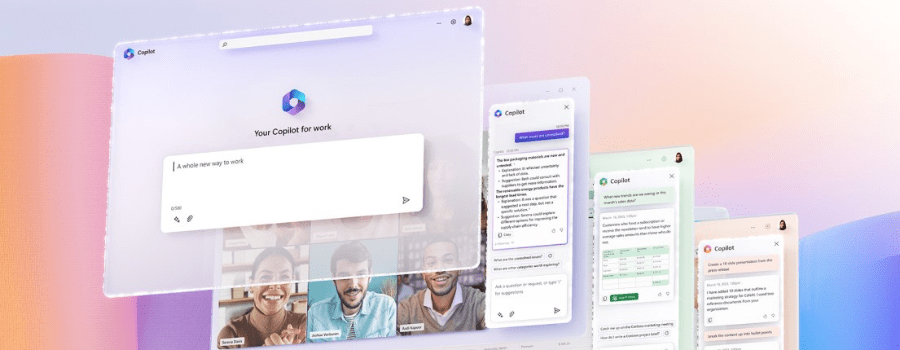
Exploring Microsoft Copilot and Its Impact on the AEC Industry
As AI continues to evolve, it promises significant efficiency and innovation across various sectors, including Architecture, Engineering, and Construction (AEC). Microsoft Copilot, a transformative AI technology, has the potential to drive significant business impact for the AEC. This blog delves into its potential and impact on the AEC industry.
The Power of Commercial Off-the-Shelf Solutions
Leveraging commercial off-the-shelf solutions, rather than relying solely on proprietary systems, can greatly benefit any industry, including the AEC. An example is Procore’s integration of Copilot into their stack. The effectiveness of AI, however, heavily depends on the quality and structure of the underlying data. This point was emphasized in a previous discussion, “Garbage In, Garbage Out,” highlighting that unstructured data without a scalable taxonomy yields poor AI outcomes.
AI in the AEC Industry
AI adoption in the AEC industry is still in its early stages. Reports from KPMG indicate significant interest in AI, but the industry is just beginning to explore its full potential. It’s essential to understand AI’s value, dispel myths about job replacement, and highlight its role in enhancing efficiency. Proper data management is crucial as the AEC industry generates an enormous amount of data. Effective data utilization can significantly impact profitability and prevent real-world disasters, making it vital for the built environment.
Understanding Microsoft Copilot
Microsoft Copilot is a significant step in democratizing AI technology, offering various personas within an organization the tools to perform their jobs more efficiently. With over a hundred Copilots available and expanding into new functional areas, Microsoft continues to innovate. For instance, currently in beta, there is a Copilot designed for frontline workers, and there are new Copilot templates for manufacturing operations. Copilot is a SaaS solution that integrates AI into organizations with minimal configuration, while Azure AI Services offer customizable AI solutions for organizations.
The Breakthrough of Generative AI
The latest iteration of Copilot stands out due to its generative AI component. Modern bots can interact in natural language, making conversations with AI more seamless and intuitive. These Copilots are grounded in data from Microsoft Office and Microsoft Graph, providing context and understanding relationships. One significant term discussed is “data debt,” which refers to the cost of managing vast amounts of information. Copilot’s ability to prioritize and quickly find important data addresses this challenge, making it a valuable tool for various functions, including sales and marketing.
Industry-Specific Applications and Integrations
Integrating Copilot with ProjectReady showcases the potential benefits for the AEC industry. Being able to access data from various systems like Microsoft 365, Autodesk, and Procore can create intelligent responses tailored to specific user needs. This capability is particularly powerful when managing complex projects with numerous documents and workflows. A practical use case involves program management for major projects like hotels and amusement parks, where Copilot can help track and compare contractual deliverables, improving accuracy and efficiency.
Grounding AI Models in Proprietary Data
One of Copilot’s most powerful features is its ability to ground AI models in proprietary data through a process called retrieval-augmented generation (RAG). By combining data from Microsoft 365 with local data sources and applying governance and security measures, Copilot delivers precise and secure answers. Additionally, organizations can train AI models with their proprietary data to gain a competitive edge. While AI is primarily built for the cloud, Microsoft offers solutions like Azure search services to index on-premise data, making it accessible and useful for AI applications.
The Future of AI in AEC
Adopting AI technology early can provide significant advantages, allowing businesses to expand and increase revenue without proportionally increasing costs. For the AEC industry, AI can help avoid rework and improve overall efficiency, transforming how projects are managed and executed. AI represents a watershed moment for many industries, including AEC. As technology continues to evolve, those who adopt AI will thrive, while those who do not risk falling behind. Understanding and adopting AI will lead to significant improvements in profitability and efficiency, making it one of the most impactful technological advancements in recent history.
